Blockchain will Affect Financial-Every now and again; a new technological advance transforms the Blockchain will affect financial services sector. However, no force has promised to shake up the business with as much force as blockchain since the advent of the internet, which occurred more than two decades ago. As a result, blockchain, the technology that underpins Bitcoin, is already seeing new uses in the financial sector.
Table of Contents
How Blockchain will Affect Financial labour market?
Blockchain can essentially be a digital ledger for those unfamiliar with the technology. The blockchain is a simple spreadsheet hosted on each user’s computer, much like Google Sheets. However, the distributed ledger keeps track of transactions and shares that data in a live database that is open to all users. Anyone with the programme can access it at any time, track it down, and compare it to itself, which enforces responsibility and makes it much harder to carry out fraudulent activities.

The effects of blockchain on financial services
Technology will significantly impact the financial services industry as innovative as blockchain. Blockchain is praised for its potential to demystify the complicated financial services sector and its ability to lower costs and increase transparency while lessening the regulatory load on the industry. However, despite its potential to serve as a starting point for providing financial services to the unbanked, many worries that its impact on the sector may have more drawbacks than advantages.
Various industries, including payments, banking, security, and more, will see the influence of this technology’s expanding use. Profit centres that make use of financial inefficiencies will receive more attention. As a result, businesses will lose their value proposition, resulting in the loss of sustainable jobs. A shift in how we do things that inevitably result in fewer jobs is what the introduction of blockchain to the finance sector is like to the impact of robotics in manufacturing.
For instance, four major financial institutions collaborated in August to create and launch the Utility Settlement Coin. A cash alternative that will allow interbank blockchain exchanges. It demonstrates the banks’ apparent intention to advance and utilize blockchain technology in the future.
Blockchain will reduce employment for some professions while creating work for others.
Blockchain will likely impact people who work in the finance industry. Smoothing the current operations of the sector would enable businesses to save a significant amount on operational costs. Which will also result in job losses.
As an illustration, blockchain transactions need very little monitoring in processing and reconciling. Therefore positions in these domains won’t be necessary as the technology is more widely adopted.
A wider adoption of blockchain means that some roles with a business will go while others create, much like how the internet upended banking in the 1990s. So it might be more accurate to predict an evolution of these professions instead of their extinction.
Financial services businesses will continue to need to check their records against blockchain to detect potential fraud or other danger sources. Which will lead to the development of new professions in security domains like encryption and identity protection.
With blockchain’s development and as more and more uses for the concept realize and implemented, a broader and more varied variety of vocations will see the same result.
Blockchain technology can potentially be used in real estate transactions and mortgage lending, reducing the need for real estate brokers and lenders.
How will use blockchain in the future
If correctly implemented, blockchain has the potential to benefit banks, other financial organizations, governments, and consumers. Likewise, individuals who might displace by blockchain should not worry about being cast out on the streets the following week.
The blockchain idea is advance significantly since, the first Bitcoin exchange used it in 2009, but it will still be a while before we can anticipate seeing it use widely.
To increase public confidence in the platform, one of the main concerns will be maintaining blockchain technology security. The distributed ledger will constantly be attacked by detractors, even though blockchain payments are currently more secure than conventional ones. Furthermore, such a novel and innovative concept will need time to gain acceptance, and any event will be more detrimental than it would be for conventional payments.
Before blockchain technology is widely adopted, it must be standardized and safeguarded. The blockchain will, nevertheless, begin to have a significant impact on financial services by 2020, in my opinion.
Blockchain will undoubtedly disrupt the game, but it isn’t easy to anticipate how exactly it will do so. So, it would be good to start planning now, knowing that the industry will see a dramatic shakeup soon.
Nowhere, Digital forms of money and their underlying blockchain technology in markets following big things following the development of the internet. The financial sector will likely be one area where these developments will significantly impact things. As a form of distribute ledger technology (DLT), the blockchain can transform rigid economic structures by bringing reduce costs. Speedier transfer fulfilment, more honesty, task inspection, and various assets. In addition, the covenant of many sectionally forward resource classes by cryptographic forms of capital without the intervention of a single authority.
Blockchain and Banking
Blockchain considers using tools like “smart contracts,” self-executing contracts based on the blockchain. Which might automate laborious processes from consistency and cases preparing to appropriate the content of a will.
By disintermediating the essential services that banks provide, such as:

Leeway and Settlement Systems:
Distributed records can cut down on operational costs and move us closer to constant transactions between financial firms.
Customer KYC and Fraud Prevention:
By storing customer data on decentralized grids, blockchain technology can make it easier and safer to distribute data among financial institutions.
Safeguards:
Blockchain technology could create more effective capital business sectors by traditional tokenizing protections like stocks, securities, and optional resources and placing them on open blockchains.
Payments:
By creating a decentralize record for expenses (like Bitcoin), blockchain technology could work with speedier instalments at cheaper rates than banks.
Obtaining donations:
Initial Coin Offerings (ICOs) are experimenting with a new model of financing that dissociates access to funds from conventional capital-raising administrations and businesses.
Advances and Credit:
Blockchain innovation can make it safer to get cash and provide, reduce loan prices by eliminating the need for guardians in the advance and credit business.
Exchange Finance:
Blockchain technology can increase transparency, security, and confidence among exchange partners globally. By replacing the heavy, paper-based bills of replenishing measures previously use in this sector.
Every firm has begun to accept blockchain technology. Thus it is progressively growing. Many people believe that the technology above is superior to all fiat currencies that have ever existed. You may go to the Bitcoin trading platform to learn about cryptocurrencies and blockchain technology.
What is the next step?
Blockchain and cryptocurrency innovation are currently generally in their infancy. However, there are a few places where we can effectively communicate them. The best way to solve the current problems is to “build working frameworks and discover where issues occur.” In addition, integration with law, regulations, and administration crucial in future digital currency and blockchain technology address yet another kind of trust.
They may succeed if they develop sufficient reliability, above and above the basic security of the dispersed records.
Conclusion
More businesses will implement private Blockchain will Affect Financial. In upcoming years to improve the transparency and traceability of their internal business systems. Including stock management systems, supply networks, and financial systems. There will be a few high-profile events that occur and more precise guidelines that will adapt.

